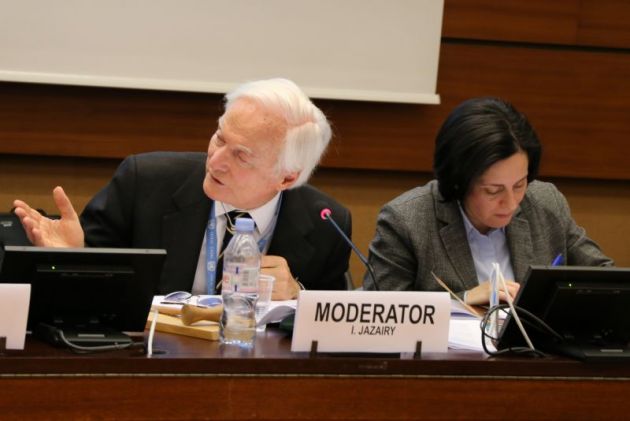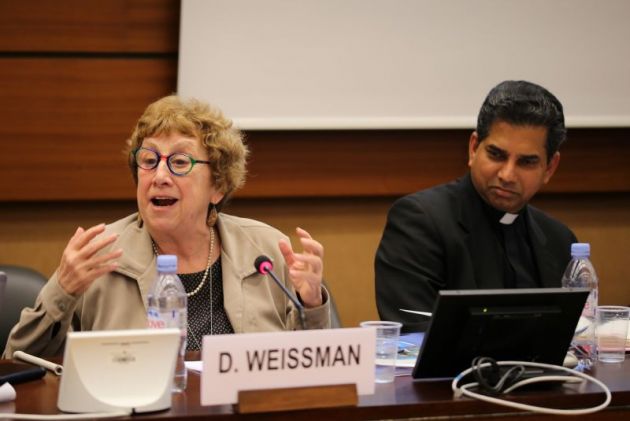'Respect for the other' lies at the heart of peace education, panelists say at UN interreligious debate

Respect for the other lies at the heart of peace education and was a key thread through a debate entitled "Education for Peace in a multi-religious world."
It was held on the 2018 World Human Rights Day at the United Nations Office in Geneva.
The Geneva Centre for Human Rights Advancement and Global Dialogue and the World Council of Churches held the debate on Dec. 10 on the impact of peace education to promote mutual understanding and cooperative relations between people and societies.
"Our goal is unity and not uniformity," said panelist Dr. Debbie Weissman, who said she is an "Israeli Jew" and former president of the International Council of Christians and Jews.
Author of "Memoirs of a Hopeful Pessimist: A Life of Activism through Dialogue," she referred to the biblical story of the creation of the human being in the image of God as "the basis of respect for the other, which lies at the heart of peace education. Human diversity is the manifestation of God's greatness."
COUNTERING EXTREMIST NARRATIVES
The conference focused on how education for peace can engage different stakeholders to counter violent, extremist narratives, build peaceful and inclusive societies as well as to promote universally shared values upheld in diverse faiths and creeds.
She said that the contemporary phenomenon of global terrorism is undoubtedly exacerbated by feelings of insecurity.
"Our goal, then, should not be the eradication of group identities but their empowerment through ensuring the safety and security of the different groups.
"Thus, we are faced with the serious educational challenge of developing a model for religious education that is dialectical -- that strengthens the particular identity and commitment of the group and its members and, at the same time, tries to inculcate within them a respect for the Other and the Other's faith, an openness to different cultures, an awareness that we are all human beings, of equal worth."
Ambassador Idriss Jazairy, executive director of the Geneva Centre's Board of Management, a former head of a UN specialized agency and top diplomat for Algeria, opened the panel debate. He said, "Today I would say peace is in jeopardy once again.
"We are exposed to a kind of a pincer movement between populism on the one hand and extremism on the other. In those circumstances, we need to see how we can defuse this tension and give the right of way to peace. We have to do this by addressing the problem already at the school level."
He said, "We are currently witnessing a pincer movement of two forces that differ in their expression but both of whom, draw on the rejection of 'the Other': the rise of xenophobic populism in advanced societies, and extremist violence in the Arab region. This is a worrying context. A context which is likely to worsen in the future if we do nothing about it.
"Education can help lift the veil of ignorance that has befallen many societies."
WCC general secretary Rev. Olav Fyske Tveit, said, in a speech opening the debate, "The question of how faith communities can educate for peace in a world torn by war and conflict is most pressing in today's world."
Tveit was unable to attend the panel discussion and his speech was read by Rev. Peniel Rajkumar, who heads the WCC's Interreligious Dialogue and Cooperation program.
"It is imperative that leaders of religious communities of various kinds recognize that one of the most solemn tasks laid upon them is to pass on a vision for the pursuit of peace to those they lead, those they teach, those whose imaginations they shape and whose consciences they help to form," said Tveit.
"Faith communities as communities of edification at various levels – formal, informal, religious and secular – have a definite role in this.
"What are the motivations and means for us to capitalize on the constant opportunities for religious communities to teach their members how to be peacemakers?" he asked.
'KNOWING ABOUT EACH OTHER'
Professor Majeda Omar of the University of Jordan and former director of the Royal Institute for Inter-faith Studies of Jordan said, "What we need to know about is, each other's religions and cultures."
She noted that it is the "lack of religious knowledge," that is the question, not "the lack of religions". Omar said, "What is needed, is not just tolerance, but mutual understanding. We have to learn how to listen to one another."
Anantanand Rambachan, professor of Religion at St. Olaf College (US) spoke from a Hindu perspective but also quoted Indian independence leader Mahatma Gandhi who spoke of "the duty of every cultured man or woman to read sympathetically, the scriptures of the world.
"If we are to respects others' religions, as we would have them respect our own, a friendly study of the world's religions is a sacred duty."
Rambachan said, "Accurate knowledge of other traditions must be complemented by the development of relationships and friendships between people of different traditions."
After his speech, Jazairy said, "Ecumenism should encompass all the Abrahamic religions, and Hinduism."
Monsignor Indunil Janakaratne, undersecretary of the Pontifical Council for Interreligious Dialogue, said, "only by changing education can we can change the world". He explained how "a humanized education" can lay down a pathway for "paternal humanism".
Dialogue is essential for "your own maturity in confronting other cultures and religions" and that "as we grow, and we develop, and we mature, this dialogue is what creates peace," said Janakaratne.
Those conducting the panel discussion included: Maria Lucia Uribe, director of Arigatou International Geneva - Ethics Education for Children; Renato Opertti, senior programme specialist, IBE-UNESCO; Beris Gwynne, founder and managing director of Incitare. former Australian diplomat and aid official and NGO executive; and Jan-Willem Bult, head of Children & Youth Media and chief editor of WADADA News for Kids.
